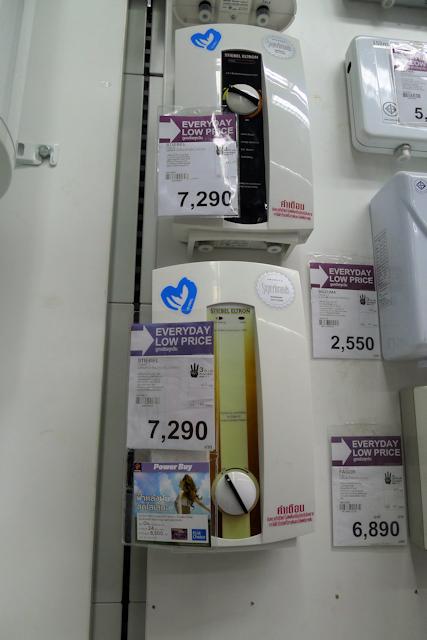Cheap on Demand Hot Water Heaters
|
| Before you shell out hundreds for a storage-tank heater or thousands for a tankless or solar model, see whether your old water heater can be fixed |
You can read the entire Consumer Reports article here.
Here is what the same article says about tankless hot water heaters
 Tankless models (a.k.a. instantaneous water heaters) are suitcase-sized units that heat water only when needed by using an electric coil (typically for low demand) or natural gas (for high demand) to heat water passing through a heat exchanger inside. They eliminate the risk of tank failure and the energy lost by constantly reheating water, though their heat exchanger can clog or fail. What's more, they're expensive to buy and install, and include limitations on hot-water flow rates, a possible issue in large households. And cooler incoming water in winter typically means your hot water may not be as hot as you like. |
The hot water heaters on sale at Lotus here in Thailand are not suitcase sized. Laptop computer sized is more like it. And we are talking roughly 10 pounds in weight. Now granted, the $65.00 models won't cut it if you are using a bathtub or Jacuzzi even if you live in Thailand. The one I have in my condo costs around $275.00. It's lasted me 5.5 years now with no problems whatsoever, and yes, I do have a Jacuzzi and it does fill up the entire Jacuzzi with very hot water.
But the more I thought about all this, the
more I started to think the problem was really not as simple as I
originally thought. After all, what might work well in Thailand
doesn't necessarily have to work at all in the United States. It's
typically around 80-88 degrees here at my Thailand condo year around.
But back in Central Illinois where I lived on a farm the water coming
into my house was probably around 55 degrees. The water comes from
underground where the temperature is constant and doesn't even
remotely approach the oftentimes harsh sub-zero temperatures of a
Central Illinois winter. But, depending upon where one wants to
put his hot water heater's thermostat, we are asking a lot more of a hot
water heater in Central Illinois than we are here in Thailand. If
one puts the thermostat at 120 degrees Fahrenheit, we are talking about
a heat rise of only 35 degrees here in my Thailand condo whereas down on
the Illinois farm it's going to take a temperature gain of 65 degrees
for that hot water heater to be doing its job.
These things run at 240 volts here in Thailand. In the U.S. the typical household runs on 110 volt wiring. This particular model is manufactured by a German company but it's assembled here in Thailand. It is rated at 8 Kilowatt at 230 volts. When I had my Jacuzzi installed I was told that I needed a hot water heater with power of that magnitude. I had bought the condo from a German company, and sure enough the hot water heater that had been originally installed produces something like 8 KW. I've learned to love the Germans because they do things right the first time
 I will admit.....when I'm taking a shower
the temperature fluctuates. This is a matter of concern to some of
the residents. But me, I've gotten used to it. My total average monthly electric bill runs
me around $65.00 and I'm paying 12 cents a kilowatt which is nearly
double the price I was paying per unit back in the last apartment I was
renting in the United States. However, the mere fact that the
water coming out of my shower keeps switching from warm to very hot
means that the water is not being heated evenly. If I turned my
thermostat down the problem wouldn't be as noticeable. It would
also help if I turned the flow rate down on the shower. But, it's
really not that irksome for me. But what would happen if I had an
incoming water temperature of 55 degrees instead of 85? My guess
it my little German designed hot water heater wouldn't be working
satisfactorily at all.
I will admit.....when I'm taking a shower
the temperature fluctuates. This is a matter of concern to some of
the residents. But me, I've gotten used to it. My total average monthly electric bill runs
me around $65.00 and I'm paying 12 cents a kilowatt which is nearly
double the price I was paying per unit back in the last apartment I was
renting in the United States. However, the mere fact that the
water coming out of my shower keeps switching from warm to very hot
means that the water is not being heated evenly. If I turned my
thermostat down the problem wouldn't be as noticeable. It would
also help if I turned the flow rate down on the shower. But, it's
really not that irksome for me. But what would happen if I had an
incoming water temperature of 55 degrees instead of 85? My guess
it my little German designed hot water heater wouldn't be working
satisfactorily at all.
The typical hot water heater with its large storage tank that needs to be kept hot all the time seems to be a very inefficient way of heating water. Solar is a compelling option where there is enough sunlight to make it economically feasible. What I am wondering, however, is if there wasn't some way to cheaply and efficiently keep a ready supply of water heated to say 80 degrees that could be used in combination with a small on demand hot water heater similar to what we are using here in Thailand?
Brochure for hot water heaters


|
|




